The Hindu Editorial (Decoding consumption) – Feb 28, 2024
To read this article, click “The Hindu”.
This preview is provided here with permission.
Courtesy: The Hindu
The Hindu Editorial (Decoding consumption) – Feb 28, 2024:
- decode (verb) – explain, understand, comprehend, interpret, figure out.
- household (noun) – family, house.
- The Household Consumption Expenditure Survey (HCES) (noun) – It is designed to collect information on consumption of goods and services by the households. The survey also collects some auxiliary information on household characteristics and demographic particulars of the households. Information collected in HCES is useful for understanding the consumption and expenditure pattern, standard of living and well-being of the households. The data collected in HCES is also utilized for deriving various other macroeconomic indicators.
- Consumption Expenditure Survey (CES) (noun) – The Consumer Expenditure Survey (CES) is usually conducted at quinquennial (recurring every five years) intervals by The National Sample Survey Organisation (NSSO). The NSS Consumer Expenditure Survey generates estimates of household Monthly Per Capita Consumer Expenditure (MPCE) and the distribution of households and persons over the MPCE classes. It is designed to collect information regarding expenditure on consumption of goods and services (food and non-food) consumed by households. The results, after release, are also used for rebasing of the GDP and other macro-economic indicators.
- private consumption or consumption expenditure (noun) – the spending by households (consumers) on goods and services, excluding new housing.
- signal (verb) – indicate, suggest, signify, denote, reveal.
- uncharacteristic (adjective) – unusual, uncommon, unconventional.
- unveil (phrase) – release, disclose, publish, reveal, make known, make public.
- broad (adjective) – comprehensive, extensive, wide, wide-ranging, broad-ranging.
- findings (noun) – conclusion arrived at (as a result of an inquiry).
- ground reality (noun) – practical condition/situation.
- decade (noun) – a period of ten years.
- census (noun) – an official survey, particularly of a population.
- due (adjective) – expected, awaited, anticipated.
- in sight (phrase) seeable, visible, noticeable; close to being achieved.
- National Sample Survey Office (NSSO) (noun) – The National Sample Survey Office (NSSO) was set up in 1950, with the idea of having a permanent survey organization to collect data on various facets of the economy. As per the government announcement dated May 23, 2019, that the National Sample Survey Office (NSSO) is merged with the Central Statistics Office to form the National Statistical Office (NSO).
- junk (verb) – discard, dispose of, throw out, get rid of.
- cite (verb) – invoke, mention, refer to, point to, adduce, turn to, resort to.
- euphemism (noun) – an innocuous (inoffensive/harmless) or pleasant word/phrase/expression that is used as an alternative to something offensive & unpleasant; polite term, indirect term, mild alternative, understatement.
- tidings (noun) – news, information, reports.
- deleterious (adjective) – damaging, adverse, disadvantageous, unfavourable, unfortunate, undesirable.
- after-effect (noun) – consequence, aftermath, repercussion; fallout, end result, outcome.
- demonetisation (noun) – the act of depriving a currency unit (note/coin) of its status as money.
- largely (adverb) – mostly, mainly, generally.
- informal economy (noun) – informal sector, grey economy is the part of an economy that is neither taxed, nor monitored by any form of government.
- subsequent (adjective) – following, ensuing, succeeding, successive.
- onset (noun) – start, beginning, arrival.
- interpret (verb) – explain, elucidate, take, take to mean, understand, comprehend.
- dash (noun) – pinch, grain, a small amount of something.
- take something with a pinch/grain/dash of salt (phrase) – be skeptical or doubtful of something; disbelieve, distrust, doubt, be wary of, be suspicious of, have no confidence/faith in.
- likely (adverb) – probably, presumably, potentially, doubtlessly.
- magnify (verb) – increase, augment, intensify, deepen, heighten, maximize.
- exuberance (noun) – excitement, elation, enthusiasm, cheerfulness, buoyancy.
- pandemic (noun) – the worldwide spread of a new disease; The illness spreads around the world and typically affects a large number of people across a wide area.
- pandemic-induced (adjective) – caused/produced by the pandemic.
- curb (noun) – constraint, restriction, limitation, control.
- pent-up (adjective) – suppressed, confined, held back, not expressed (emotions/feelings).
- pent-up demand (noun) – pent up demand is a build-up of demand for goods and services in an economy where consumers are unable or unwilling to make purchases to satisfy the demand at the present time. Pent up demand happens during periods when consumers are reluctant or unable to make needed or desired purchases. This generally occurs during times of economic uncertainty – such as a recession.
- to be clear (phrase) – used to say something should be comprehensible/understandable.
- suggest (verb) – indicate, signify, denote, point to.
- transition (noun) – change, shift, transformation.
- swiftly (adverb) – quickly, instantly, promptly, immediately, suddenly, expeditiously.
- enable (verb) – facilitate, make (something) possible; warrant, authorize, validate.
- per-capita (adjective) – relating to each person; per person, for each, individual.
- sought past tense of seek (verb) – try, aim, attempt.
- paint (verb) – narrate, outline, detail; portray, render, represent, depict.
- narrow (verb) – diminish, decrease, reduce, lessen.
- inequality (noun) – Inequality is simply defined as “the state of not being equal, especially in status, rights and opportunities; imbalance, unevenness, disproportion, disparity.
- slippage (noun) – decrease, reduction; deficiency, shortage.
- imply (verb) – suggest, indicate, point to, signify.
- compound annual growth rate (CAGR) (noun) – growth of something (economy, investment, etc.) calculated over a period of years, showing the percentage increase for each year over the previous year.
- inflation (noun) – simply meaning “cost of living”; increase of price level of goods & services and vice versa decrease of currency value.
- Gross domestic product (GDP) (noun) – a measure of economic activity in a country. the total value of all final goods and services produced within the country in one financial year.
- puzzlingly (adverb) – perplexingly, bewilderingly, mystifyingly, bafflingly.
- imputed (adjective) – estimated.
- myriad (adjective) – various, many and various, manifold, multiple.
- welfare (noun) – (noun) – a government program that provides (financial) assistance to individuals and families in need; social security, government/state benefit, public assistance.
- PM Garib Kalyan Anna Yojana (PM-GKAY) (noun) – The PM Garib Kalyan Anna Yojana scheme was part of the Centre’s initial COVID-19 relief package, back in March 2020 when the first lockdown was announced. It provides for 5 kg of rice or wheat per person per month to be distributed free of cost to the 80 crore beneficiaries of the National Food Security Act.
- peer (noun) – ( of a person) equal, fellow.
- proportion (noun) – ratio, distribution, relative amount/number.
- slip (verb) – fall, sink, drop, go down, decrease.
- cereal (noun) – a grain or plants that produce it (for example-wheat, maize, rice & etc.).
- drop (noun) – decrease, reduction, decline, slump, depreciation.
- ease (verb) – decrease, lessen, diminish, reduce, lower.
- rejig (verb) – reorganize, rearrange, revise, reconstitute,
- index (noun) – an (economic) data figure reflecting something (e.g. price/quantity) compared with a standard or base value; pointer, indicator.
- consumer price index (CPI) (noun) – a monthly measurement of prices for most household goods and services.
- Wholesale Price Index (WPI) (noun) – The WPI looks at a basket of wholesale goods (goods purchased in large quantities by businesses directly from manufacturers with the intent of reselling them to retailers). the WPI tracks prices at the factory gate before the retail level.
- weightage (noun) – importance, significance, value (of something when compared with another thing).
- pertinent (adjective) – relevant, appropriate, applicable, germane, suitable.
- recall (verb) – remember, recollect, call to mind, think of.
- food inflation (noun) – the condition of an increase in the wholesale price index of a necessary food item relative to the general index or the consumer price index (CPI) is referred to as food inflation. In layman’s language, it is basically the rise in the cost of an essential food item relative to the previous price.
- spike (adjective) – increase sharply.
- elevated (adjective) – increased, raised.
- proportional (adjective) – corresponding, comparable, commensurate, relative, correlative.
- picture (noun) – impression, view, vision, notion.
- devoid of (noun) – lacking, without, free of/free from.
- flip-flop (noun) – a sudden reversal of something, particularly a policy/plan.
- recalibration (noun) – reevaluation, reassessment, reorganization/revamp.
Note :
1. Click each one of the words above for their definition, more synonyms, pronunciation, example sentences, phrases, derivatives, origin and etc. from http://www.oxforddictionaries.com/.
2. Definitions (elementary level) & Synonyms provided for the words above are my personal work and not that of Oxford University Press. Tentative definitions/meanings are provided for study purposes only and they may vary in a different context.
3. This word list is for personal use only. Reproduction in any format and/or Commercial use of it is/are strictly prohibited.
The Hindu Editorial (Decoding consumption) – Feb 28, 2024:
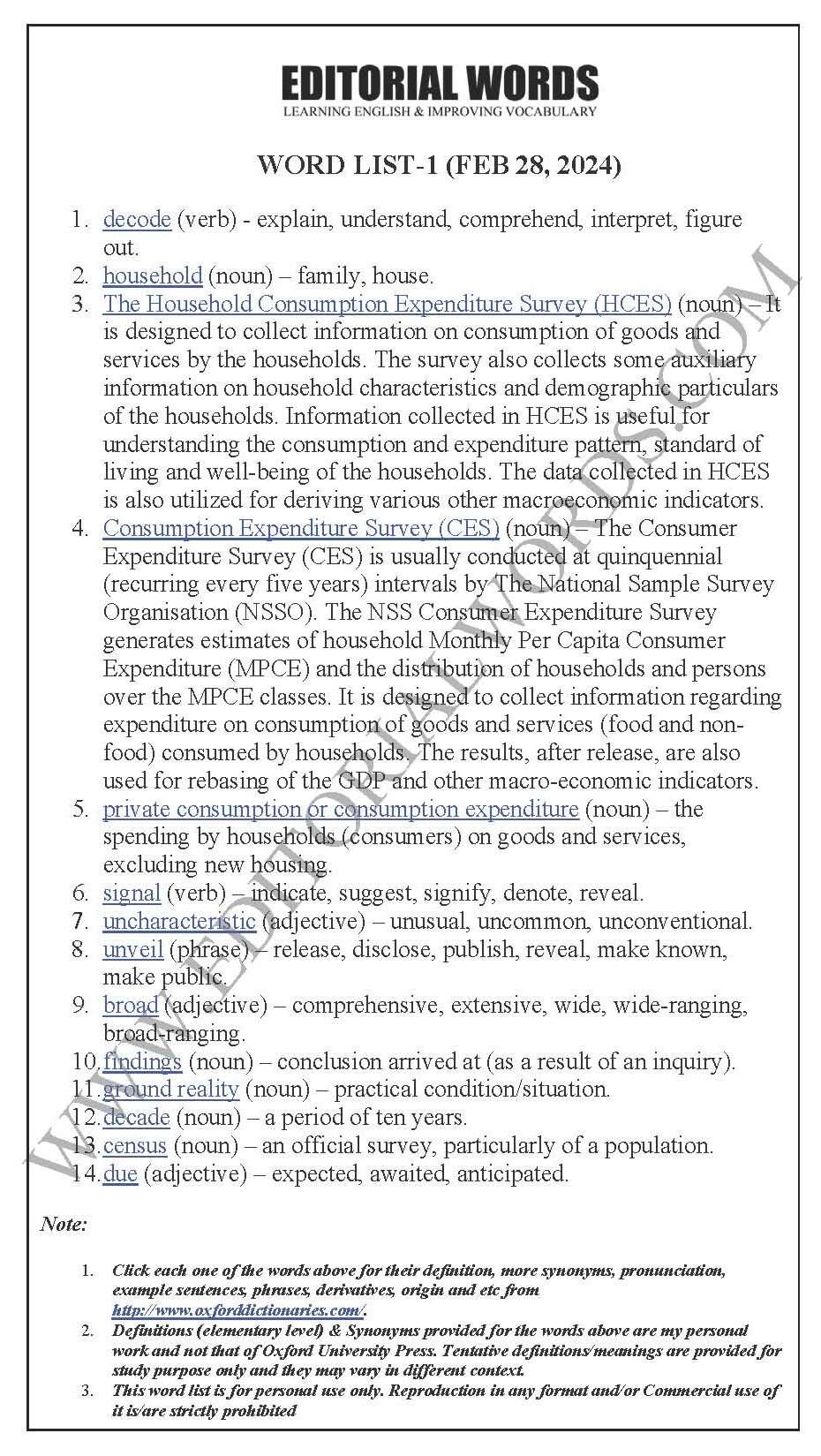
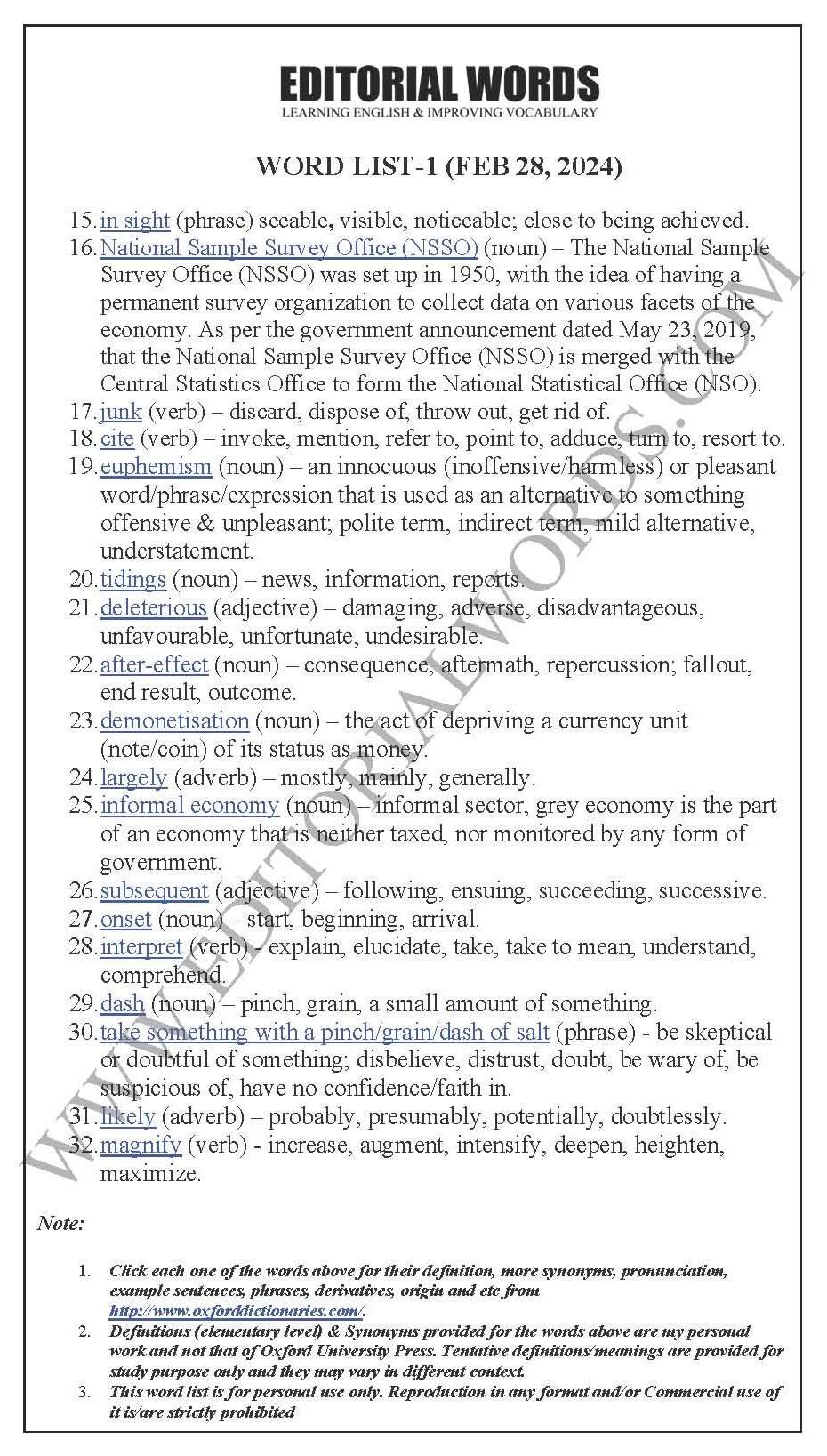
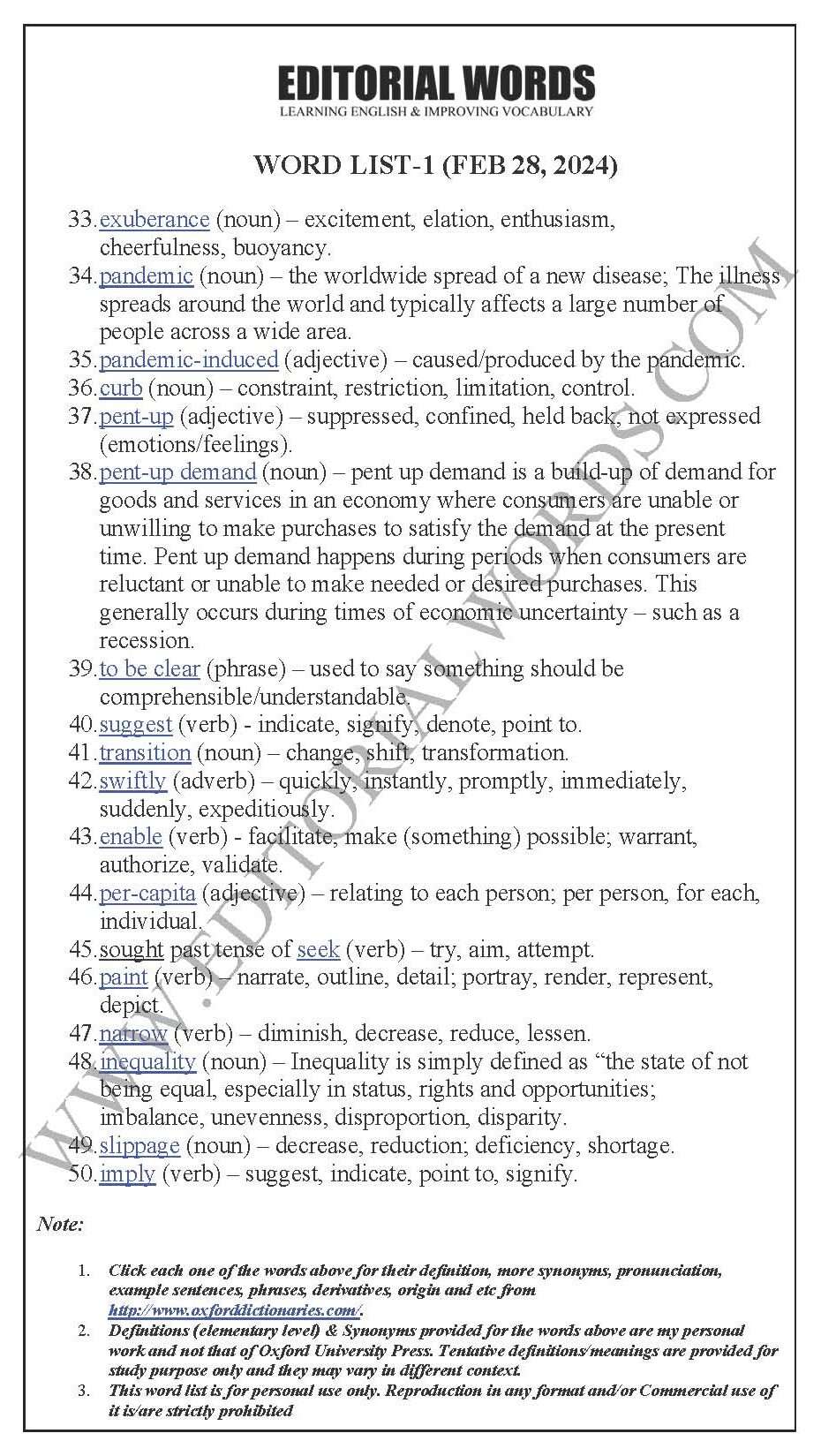
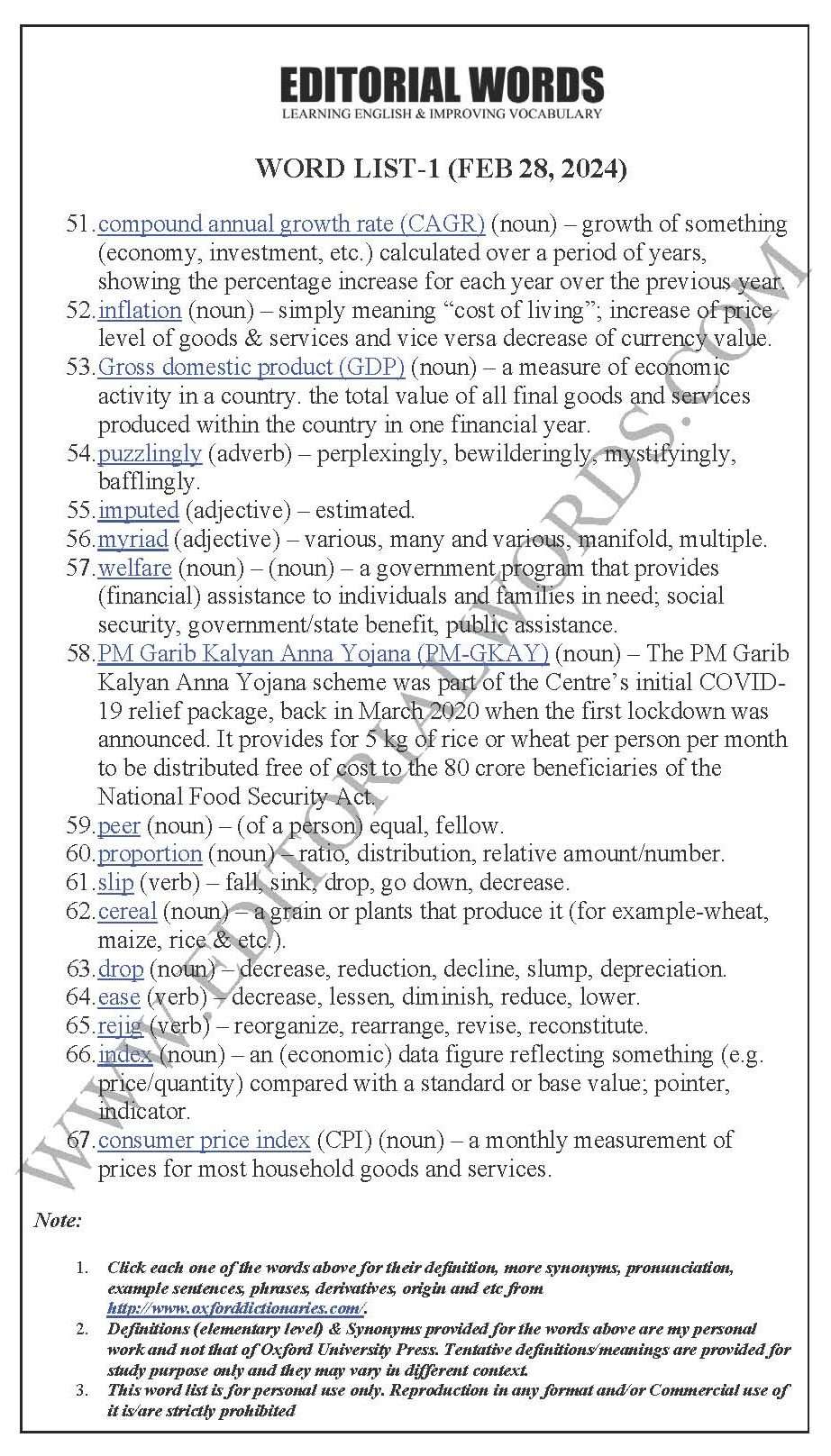
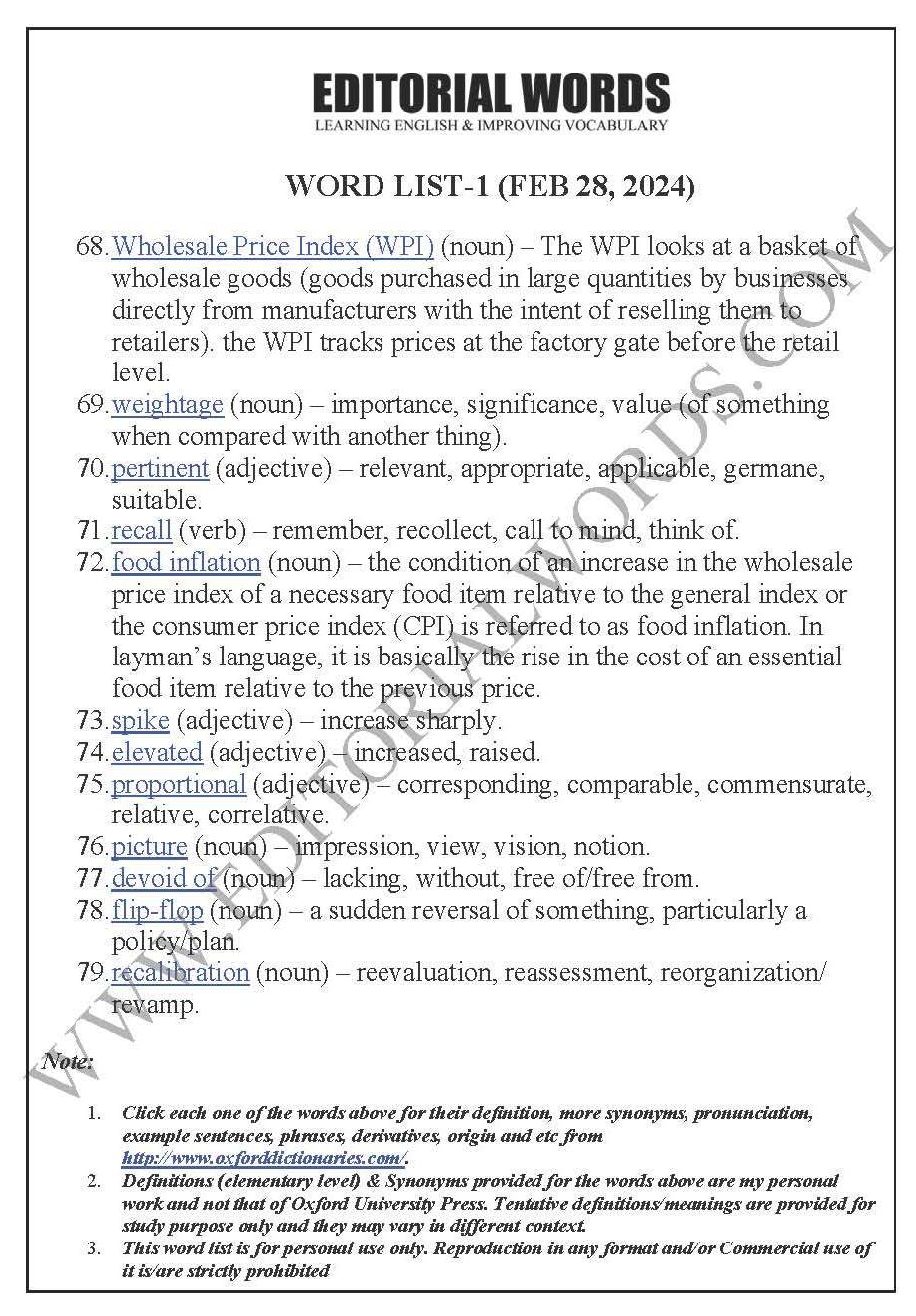
“Phrasal Verbs” We Learnt Last Week
“Idioms & Phrases” We Learnt Last Week
“Important Definitions” We Learnt Last Week
Recent Word Lists For The Hindu Editorial Articles

In an uncharacteristic late Saturday release, the Statistics Ministry unveiled the broad findings of the Household Consumption Expenditure Survey done between August 2022 and July 2023… For further reading, visit “The Hindu”. Below is today’s word list-1 for The Hindu Editorial (Decoding consumption) – Feb 28, 2024.